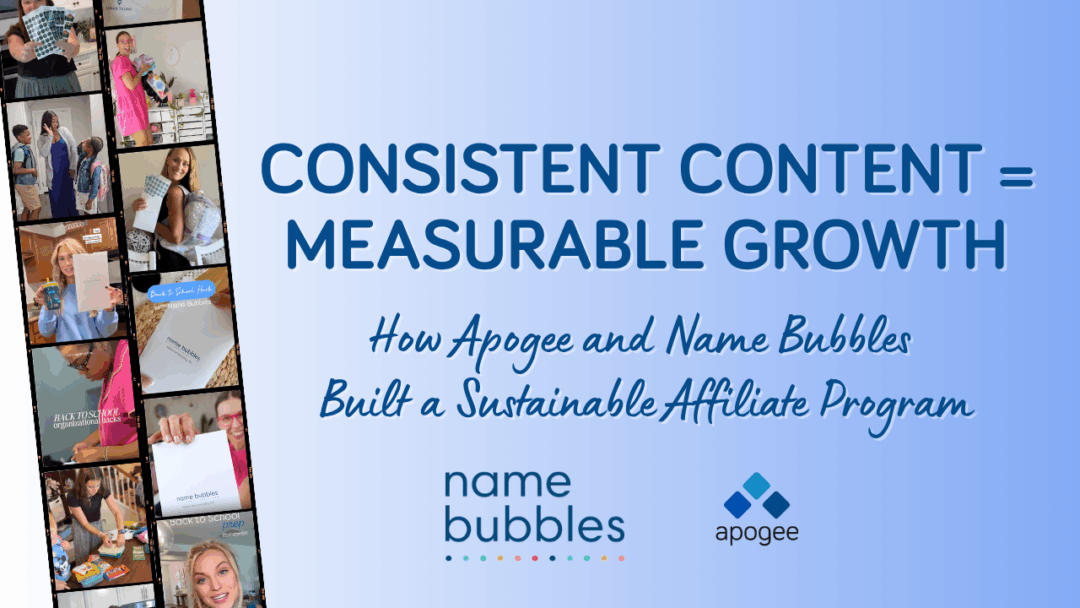
Maximizing Black Friday Affiliate Sales Success for Bloggers and Influencers
November 8, 2023
Affiliate Education for Bloggers
December 27, 2023Discover the steps to launch a successful affiliate program for your business. Learn how to select the right affiliates, set fair compensation, and optimize your strategy for maximum growth. Boost your online presence and drive sales today!

Are you a business owner looking to boost your online presence and drive more sales? Launching an affiliate program could be the solution you've been searching for. In today's digital age, where e-commerce, DTC (Direct-to-Consumer) brands, and online sales are booming, affiliate marketing has become a powerful tool for businesses to expand their reach and increase revenue.
1. Understand the Basics of Affiliate Marketing
Before diving headfirst into launching your affiliate program, it's crucial to grasp the fundamentals. Familiarize yourself with key terms like DTC, AOV (Average Order Value), and monthly sales volume. DTC refers to selling products directly to consumers, often bypassing traditional retail channels. AOV is a metric that calculates the average amount spent by customers in a single order. Monthly sales volume represents the total sales generated in a given month.
2. Assess Your Readiness
Launching an affiliate program requires some groundwork. Ensure that your business has high enough margins to support proper affiliate compensation. Affiliates typically earn commissions for driving sales, so it's essential to factor this into your pricing structure. Additionally, having a dedicated affiliate manager on staff can significantly enhance your program's success. This manager will be responsible for recruiting, communicating with, and supporting your affiliates.
3. Identify Your Target Affiliates
Affiliate marketing relies on partnerships with individuals or entities that can promote your products effectively. Consider reaching out to influencers in your industry who have a substantial following and align with your brand values. These influencers can help you reach a broader audience and build trust with potential customers. It's vital to choose affiliates who can authentically represent your products or services.
4. Choose the Right Affiliate Network
To run a successful affiliate program, you'll need a reliable platform or network to manage your affiliate relationships and track performance. There are numerous affiliate marketing networks available, such as ShareASale, CJ Affiliate, and Rakuten Advertising. Selecting the right network is crucial, as it will impact the ease of setup and the quality of affiliates you attract.
5. Set Clear Objectives and Compensation Structure
Before you can recruit affiliates, you must define your program's objectives and create a fair compensation structure. Be transparent about your commission rates, payment frequency, and any performance bonuses or incentives. Ensure that your compensation aligns with industry standards to attract top-quality affiliates who are motivated to drive results.
Related Article: Affiliates vs Influencers – Is There A Difference?
6. Create Compelling Marketing Materials
Affiliates will need promotional materials to effectively market your products. Develop a range of marketing assets, including banners, product images, text links, and email templates. These materials should be visually appealing, informative, and optimized for conversions. Make them readily available to your affiliates within the affiliate network.
7. Recruit and Onboard Affiliates
With your program in place, it's time to start recruiting affiliates. Reach out to potential affiliates who match your brand's ethos and audience. Leverage your dedicated affiliate manager to build relationships and provide training. Ensure that affiliates understand your product offerings, target audience, and promotional guidelines. Effective onboarding is crucial for a successful partnership.
8. Monitor and Optimize Affiliate Program Performance
Once your affiliate program is up and running, it's essential to continuously monitor performance. Use the tracking capabilities of your chosen network to assess key metrics like click-through rates, conversion rates, and revenue generated by affiliates. Identify top-performing affiliates and offer them additional support or incentives. Simultaneously, address any underperforming affiliates and provide guidance to help them improve.
9. Communicate and Provide Support to Affiliates Consistently
Effective communication is the backbone of a successful affiliate program. Keep open lines of communication with your affiliates through regular emails, newsletters, and webinars. Provide them with the latest product updates, promotions, and marketing strategies. Be responsive to their inquiries and offer timely assistance when needed.
10. Regularly Review and Adapt
The digital landscape is constantly evolving, and your affiliate program should evolve with it. Regularly review your program's performance and assess whether it aligns with your business goals. Be prepared to make adjustments and adapt your strategies to stay competitive. This could involve revising commission rates, exploring new promotional channels, or expanding your affiliate network.
In conclusion, launching an affiliate program can be a game-changer for your business's online growth. By understanding the basics, assessing your readiness, recruiting the right affiliates, and optimizing your program, you can harness the power of affiliate marketing to boost your brand's visibility and increase sales. Remember, success in affiliate marketing requires dedication, clear communication, and a willingness to adapt to the ever-changing digital landscape. So, take the leap and start building your affiliate program today!




